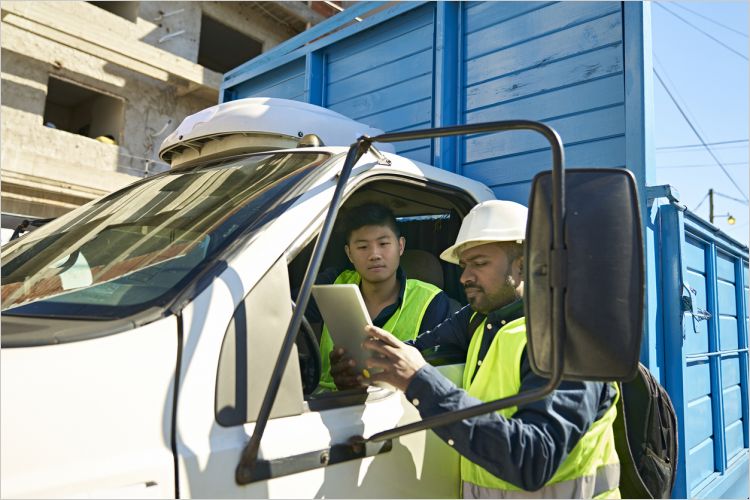
Photo: iStock.com/xavierarnau
Small, minority- and women-owned fleets face greater financial and institutional impediments to acquiring low-carbon solutions for their businesses, relative to larger, established, companies. New research from the International Council on Clean Transportation backs this up, citing key barriers that include limited access to information and technical support and insufficient time and capacity outside of work hours to navigate government processes. Fleet owners and operators who fall within these categories must contend with a disproportionately high level of difficulty in securing support and resources to assist them in replacing conventional trucks with battery-electric ones and installing charging infrastructure.
Canada’s commitment
An uneven playing field is more than just a challenge for individual business owners.
The Government of Canada has committed to introducing targets that will require automakers and importers to ensure that, by 2030, 35 per cent of their sales of new medium- and heavy-duty vehicles (MHDVs) are zero-emission vehicles, increasing to 100 per cent of sales by 2040, where feasible.
Already, adoption rates of electric and low-carbon MHDVs are rising in Canada and internationally. Between 2020 and 2021, the sales share of zero-emission MHDVs increased from 6.1 per cent to 10.3 per cent globally with electric buses constituting the majority share. In Canada, over the same time period, sales share moved up from 1.7 to 3.7 per cent.
While encouraging, several significant barriers will need to be addressed to unlock rapid and widespread uptake for Canada to meet its goal to end the combustion-engine era. Success will depend on all stakeholders having access to the types of zero-emission MHDVs that their businesses require.
Pembina Institute’s role
We at the Pembina Institute are launching a new outreach initiative with under-resourced fleet operators who face unique hurdles in transitioning to electric road freight. Through community outreach, supported by research and data analysis, we will create a suite of resources to enable disparate communities to navigate the transition to emission-free transport options.
Our aim is to ensure that all fleet owners, regardless of size or background, benefit from a phased-in shift to zero-emission road freight. In general, some climate-related policies and regulations will have an outsized impact on the dynamics of an economic sector; commercial freight is one of those sectors. Understanding what is preventing some owner/operators from adopting emission-free vehicles is the first step in developing tools and networks that will support a pathway to fleet electrification.
Roadblocks
Early results reveal the kinds of impediments small fleet owners grapple with to the detriment of their operations and slowing rates of adoption. The most frequently cited challenges are:
- Insufficient time and capacity to research market-ready zero-emission MHDVs or to attend webinars, workshops or conferences that focus on the commercial viability of electric road freight and anticipated developments in the industry.
- Information materials are mostly written in English, which can be a language barrier. Moreover, the information provided is often very technical and difficult to decipher.
- Points of sale cater to the procurement needs of businesses with large fleets, often lack inclusive imagery, and present case studies that do not reflect the experiences or requirements of under-served groups. Dealers, a frequent source of information, tend to engage with larger fleet operators that are more advanced in the electric vehicle transition process with greater access to capital.
- Under-represented and under-served fleet owners are rarely part of formal, well-established trucking associations or networks.
- Not uncommonly, small enterprises have far less access to favourable financing arrangements, operate on the thinnest of margins, and may or may not possess a yard where infrastructure can be installed.
Lane change
We are focused on a handful of key metrics that will indicate the effectiveness of the tools, resources, and knowledge-sharing networks that have been developed through this project. By its conclusion, we will be looking for new commitments among stakeholders to transition to zero-emission commercial vehicles. End-of-project outcomes, however, are short-term wins, and are understood as the foundation (rather than the endpoint) for building new partnerships and collaborations to undertake additional research and grow reach.
To put the need for a rapid turnover to low-carbon road transportation in context, greenhouse gas (GHG) emissions from commercial freight activity increased by 225 per cent over the past two decades and the transportation sector overall generates more carbon emissions than any other sector of the Canadian economy except oil and gas production.
Not only will the electrification of road transport dramatically lower GHG levels – from 35 Mt in 2020 to 10 Mt or less by mid-century in the MHDV sector alone – the deployment of emission-free vehicles of all class sizes will provide health and economic benefits as well. Yet the barriers listed above impede progress. For the federal government’s mandate to oversee a 40 to 45 per cent drop in Canada’s GHGs by 2030 and a commitment to sales of only zero-emission MHDVs by 2040, existing disparities must be minimized so that consumers and fleet operators at all income and operational levels are able to secure the knowledge and means to sustainable transportation.
Join the conversation
Stay up to date on the progress of our effort to reduce inequities in the transition to a non-emitting freight sector by signing up for our e-newsletter, Pembina Perspectives. Findings from interviews, focus groups, and research will be released in the spring, shedding light on how we can collaborate to develop policies that ensure inclusivity in the shift to emission-free road freight.
Sarah is a senior analyst with the transportation program and is based in the Vancouver office.



